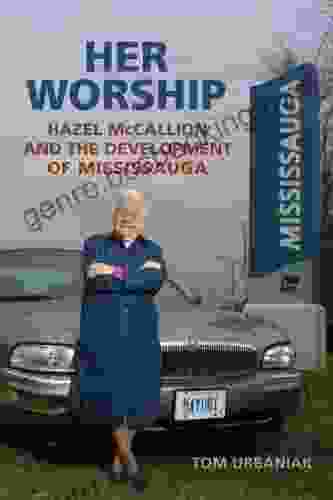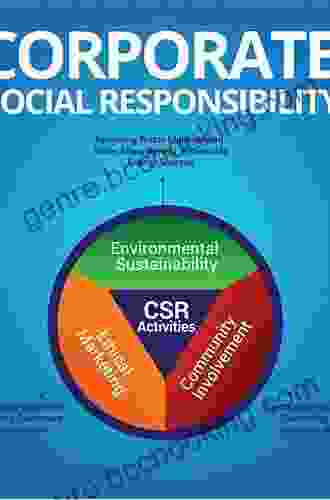Practical Approach to Design for Social Responsibility: Empowering Change Through Design

In today's rapidly evolving world, the role of design extends far beyond aesthetics and functionality. Design has emerged as a powerful tool for addressing pressing social and environmental challenges and driving meaningful change in our communities.
5 out of 5
| Language | : | English |
| File size | : | 5301 KB |
| Text-to-Speech | : | Enabled |
| Screen Reader | : | Supported |
| Enhanced typesetting | : | Enabled |
| Print length | : | 216 pages |
This comprehensive article is your guide to the practical applications of design for social responsibility. We will explore real-world case studies, frameworks, and best practices that empower designers to create impactful solutions that positively transform society.
Understanding Design for Social Responsibility
Design for social responsibility (DfSR) is a human-centered design approach that prioritizes social and environmental impact in the design process. It involves understanding the needs of vulnerable communities, identifying opportunities for improvement, and creating solutions that promote equity, inclusivity, and sustainability.
DfSR practitioners use a variety of methods and tools, including user research, participatory design, and co-creation. By engaging stakeholders throughout the design process, DfSR practitioners ensure that the solutions they create are relevant, sustainable, and empowering.
Case Studies: DfSR in Action
To illustrate the transformative power of DfSR, let's explore a few inspiring case studies:
- Project Prakash: This initiative leveraged design to develop an affordable, portable solar light that provided communities in India with access to clean and sustainable lighting.
- The Empathy Machine: This immersive virtual reality experience allows users to step into the shoes of individuals facing homelessness, fostering empathy and understanding.
- Litterati: This mobile app empowers individuals to track and map litter, providing valuable data for waste reduction initiatives.
Frameworks for DfSR
To guide the implementation of DfSR, several frameworks have been developed. These frameworks provide a structured approach to identifying social needs, developing innovative solutions, and measuring impact.
One widely used framework is the Double Diamond Design Process. This iterative process involves four stages:
- Discover: Understand the problem space and identify user needs.
- Define: Clearly define the design challenge and develop a design brief.
- Develop: Generate and prototype potential solutions.
- Deliver: Implement the chosen solution and evaluate its impact.
Best Practices for DfSR
To maximize the impact of DfSR projects, it's crucial to adhere to certain best practices:
- User-centered approach: Involve stakeholders throughout the design process to ensure solutions meet their needs and aspirations.
- Empathy and inclusion: Foster a deep understanding of the needs of marginalized and vulnerable communities.
- Collaboration and partnerships: Bring together diverse expertise from designers, researchers, and stakeholders to achieve collective impact.
- Sustainability: Consider the environmental impact of solutions and strive for long-term sustainability.
- Measurement and evaluation: Track and evaluate the social and environmental impact of your solutions.
Empowering Change Through Design
Design for social responsibility is not just a concept but a transformative movement that empowers designers to create meaningful change. By embracing DfSR principles and best practices, designers can harness their skills to address social inequities, promote environmental sustainability, and build a more just and equitable society for all.
We encourage you to explore the resources available on the Practical Approach to Design for Social Responsibility website, where you can find additional case studies, frameworks, and tools to guide your DfSR journey. Together, let's harness the power of design to create a better future for generations to come.
5 out of 5
| Language | : | English |
| File size | : | 5301 KB |
| Text-to-Speech | : | Enabled |
| Screen Reader | : | Supported |
| Enhanced typesetting | : | Enabled |
| Print length | : | 216 pages |
Do you want to contribute by writing guest posts on this blog?
Please contact us and send us a resume of previous articles that you have written.
 Book
Book Novel
Novel Page
Page Chapter
Chapter Text
Text Story
Story Genre
Genre Reader
Reader Library
Library Paperback
Paperback E-book
E-book Magazine
Magazine Newspaper
Newspaper Paragraph
Paragraph Sentence
Sentence Bookmark
Bookmark Shelf
Shelf Glossary
Glossary Bibliography
Bibliography Foreword
Foreword Preface
Preface Synopsis
Synopsis Annotation
Annotation Footnote
Footnote Manuscript
Manuscript Scroll
Scroll Codex
Codex Tome
Tome Bestseller
Bestseller Classics
Classics Library card
Library card Narrative
Narrative Biography
Biography Autobiography
Autobiography Memoir
Memoir Reference
Reference Encyclopedia
Encyclopedia Scholastic
Scholastic Stephanie Sabol
Stephanie Sabol Patrick Rush
Patrick Rush Stefan C Reif
Stefan C Reif Leisy J Abrego
Leisy J Abrego Stuart D Paine
Stuart D Paine Laura Sebastian
Laura Sebastian Larry Turner
Larry Turner Virginia I Postrel
Virginia I Postrel Michael Hermann
Michael Hermann Robin Goodfellow
Robin Goodfellow Michael Cabbage
Michael Cabbage Michael Bennett
Michael Bennett Lisa Mcclatchy
Lisa Mcclatchy Sean Skahan
Sean Skahan Larry Vaughn
Larry Vaughn Linda Kemp
Linda Kemp Lindy Boone Michaelis
Lindy Boone Michaelis Lewis Grassic Gibbon
Lewis Grassic Gibbon L Renee Whaley
L Renee Whaley
Light bulbAdvertise smarter! Our strategic ad space ensures maximum exposure. Reserve your spot today!

 Ernest ClineUnveiling the Artistic Secrets: A Journey from Sketch to Watercolour Painting
Ernest ClineUnveiling the Artistic Secrets: A Journey from Sketch to Watercolour Painting
 Enrique BlairThe Adolescent and Adult Neurodiversity Handbook: A Comprehensive Guide to...
Enrique BlairThe Adolescent and Adult Neurodiversity Handbook: A Comprehensive Guide to...
 Roger TurnerNative Son on Janesville and General Motors: A Story of Grit, Race, Gender,...
Roger TurnerNative Son on Janesville and General Motors: A Story of Grit, Race, Gender,...
 Victor HugoThe Ultimate Guide to Drawing Botanical Delights: Step-by-Step Instructions...
Victor HugoThe Ultimate Guide to Drawing Botanical Delights: Step-by-Step Instructions... Jerry HayesFollow ·15.9k
Jerry HayesFollow ·15.9k Terry BellFollow ·18.5k
Terry BellFollow ·18.5k Andy HayesFollow ·2k
Andy HayesFollow ·2k Jake CarterFollow ·15.5k
Jake CarterFollow ·15.5k Justin BellFollow ·6.2k
Justin BellFollow ·6.2k Simon MitchellFollow ·7k
Simon MitchellFollow ·7k H.G. WellsFollow ·8.3k
H.G. WellsFollow ·8.3k Joseph FosterFollow ·17.6k
Joseph FosterFollow ·17.6k

 Branden Simmons
Branden SimmonsUnveiling the World of Tequila: A Collector's Guide to...
: Prepare to embark on a tantalizing journey...

 Chuck Mitchell
Chuck MitchellHazel McCallion and the Development of Mississauga: A...
: The Matriarch of Mississauga Hazel...

 Lucas Reed
Lucas ReedUnveiling the Hidden Treasures of Tequila, Mezcal, and...
Prepare to be captivated...

 Isaias Blair
Isaias BlairBusinesses With Stories: The Power of Storytelling in...
In today's competitive business environment,...

 Ethan Gray
Ethan GrayUnveiling the World of Tequila, Mezcal, and Sotol: The...
Embark on a...

 Barry Bryant
Barry BryantClare Boothe Luce: Renaissance Woman
In the annals of history, few...
5 out of 5
| Language | : | English |
| File size | : | 5301 KB |
| Text-to-Speech | : | Enabled |
| Screen Reader | : | Supported |
| Enhanced typesetting | : | Enabled |
| Print length | : | 216 pages |




